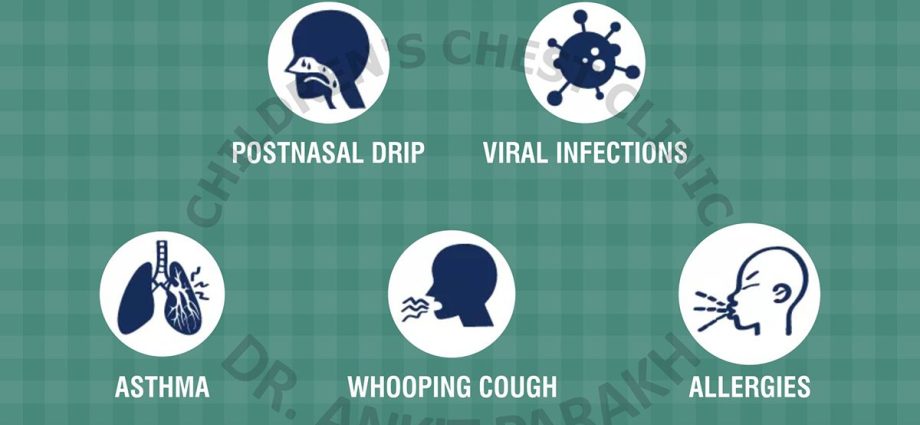Contents
Causes of allergic cough in a child
In fact, coughing is a protective reflex of our body. Allergic cough is the body’s reaction to particles of allergens that have got into it.
Consider the reasons why a cough can develop when allergens enter the respiratory tract. The fact is that when the allergen comes into contact with the mucous membrane of the respiratory tract, an immune reaction occurs, leading to inflammation. As a result, the destruction of the epithelium occurs, the mucous membrane swells, all this leads to irritation and, as a result, coughing.
In addition, a coughing fit can occur due to the accumulation of sputum, which begins to be produced in large quantities.
The most common allergens that cause the development of allergic cough in children are plant pollen during their flowering, pet hair, house dust, and some types of food products.
Cough of allergic origin differs from cough with viral and bacterial infections of the respiratory tract in the following features:
- Usually allergic cough has a dry and barking character;
- With a cough that is allergic in nature, the temperature usually does not rise;
- Has a paroxysmal character;
- Occurs more often at night;
- It is protracted and can last for several weeks.
Allergic cough is usually accompanied by other characteristic symptoms:
- runny nose and sneezing;
- Eye redness and tearing;
- Perspiration and itching in the throat;
- Feeling of congestion or tightness in the chest;
- The sputum is light-colored, non-purulent, usually separated at the end of the attack.
There are several allergic diseases, a symptom of which may be a cough:
- Laryngitis or allergic inflammation of the mucous membrane of the larynx can occur in both children and adults. The most common manifestation of allergic laryngitis is a sore throat and cough without sputum;
- Tracheitis or allergic inflammation of the trachea;
- Allergic bronchitis is an inflammation of the bronchial mucosa. The most common symptoms of this disease are dry cough with scanty sputum, whistling or wheezing when breathing.
- Bronchial asthma is a fairly common serious allergic disease. It is based on inflammation of both the lungs and bronchi. The incidence of bronchial asthma is 1 per 10 population in developed countries. It often develops at an early age and may progress into adulthood. In some cases, on the contrary, bronchial asthma disappears when the child grows up.
- Swelling of the mucous membrane of the larynx or croup is the most severe manifestation of allergy in young children. It can cause a sharp narrowing of the larynx, which prevents the passage of air and leads to oxygen starvation. A characteristic symptom in this case is whistling during breathing, wheezing in the lungs, pallor of the skin, and nervous excitement.
Treatment of allergic cough in a child
Treatment of allergic cough in a child is mainly medication. The following groups of drugs are prescribed:
- Antihistamines. These include:
- Zirtek – drops are allowed for use from 6 months, tablets from 6 years;
- Zodak – drops can be used in children from 1 year old, tablets – in children over 3 years old;
- Erius – in syrup older than 1 year, tablets – from 12 years of age;
- Cetrin – in syrup over 2 years old, tablets from 6 years old;
- Suprastin – intramuscular injections are allowed for use from 1 month.
- Corticosteroid drugs are potent. They must be used with caution and only in a hospital setting;
- Inhalation drugs (salbutamol, berodual, etc.)
- Expectorants, such as lazolvan, ambrobene.
Prevention of allergic cough in a child at home
Prevention of allergic cough in a child at home
The basis of the prevention of allergic cough is to prevent the child from coming into contact with all possible allergens. For this purpose it is necessary:
- Regularly ventilate the room in which the child is located;
- Carry out wet cleaning of the apartment at least 2 times a week;
- It is recommended to limit the contact of the child with pets, if any;
- During the flowering period of plants whose pollen causes allergies, it is necessary to take antihistamines. However, this should be done only after consulting a doctor.










